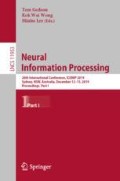Abstract
The polysomnography (PSG) can be used as a basis for judging various disorders that occur during sleep such as arousal. Arousal which means wakefulness is the common phenomena disturbing deep sleep. Since arousal appears in various forms, there are areas where research has been less advanced such as Respiratory effort-related arousal (RERA). We develop bidirectional Long Short-Term Memory (LSTM) which used Mel-frequency cepstral coefficient (MFCC) for feature extraction and trained using 13 multi-channel signals from Physionet Challenge 2018. The training model predicts arousal probability on every input data. Signals are processed with MFCC and we test a various combination of features such as the number of features and additional delta feature. Finally, top 3 models are used to construct an ensemble model which shows the best performance in our experiments. We obtain 0.898 AUC-ROC and 0.458 AUC-PR on the test data which is split from 994 training data. Performance of our model is competitive to other methods proposed in the Physionet Challenge 2018. Bidirectional LSTM makes a sequential prediction on arousal and MFCC can be applied uniformly on the signal data regardless of signal type. Therefore, we can process feature extraction efficiently without any manual approaches.
This work was supported by the International Research & Development Program of the National Research Foundation of Korea (NRF) funded by the Ministry of Science, ICT & Future Planning of Korea (2016K1A3A7A03952054) and Energy Cloud Technology Development Project through the Ministry of Science and ICT(MSIT) and National Research Foundation of Korea (NRF-2019M3F2A1073036).
Access this chapter
Tax calculation will be finalised at checkout
Purchases are for personal use only
References
Aggarwal, K., Khadanga, S., Joty, S.R., Kazaglis, L., Srivastava, J.: Sleep staging by modeling sleep stage transitions using deep crf. arXiv preprint (2018). arXiv:1807.09119
Cen, L., Yu, Z.L., Kluge, T., Ser, W.: Automatic system for obstructive sleep apnea events detection using convolutional neural network. In: 2018 40th Annual International Conference of the IEEE Engineering in Medicine and Biology Society (EMBC), pp. 3975–3978. IEEE (2018)
Cheng, M., Sori, W.J., Jiang, F., Khan, A., Liu, S.: Recurrent neural network based classification of ecg signal features for obstruction of sleep apnea detection. In: 2017 IEEE International Conference on Computational Science and Engineering (CSE) and Embedded and Ubiquitous Computing (EUC), vol. 2, pp. 199–202. IEEE (2017)
Dey, D., Chaudhuri, S., Munshi, S.: Obstructive sleep apnoea detection using convolutional neural network based deep learning framework. Biomed. Eng. Lett. 8(1), 95–100 (2018)
Ghassemi, M.M., et al.: You snooze, you win: the physionet/computing in cardiology challenge 2018. Hypertension 40(41.0), 40–46 (2018)
He, R., Wang, K., Liu, Y., Zhao, N., Yuan, Y., Li, Q., Zhang, H.: Identification of arousals with deep neural networks using different physiological signals (2018). https://doi.org/10.22489/CinC.2018.060
Hochreiter, S., Schmidhuber, J.: Long short-term memory. Neural Comput. 9(8), 1735–1780 (1997)
Howe-Patterson, M., Pourbabaee, B., Benard, F.: Automated detection of sleep arousals from polysomnography data using a dense convolutional neural network. Signal 1, 2 (2018)
Kumar, K., Kim, C., Stern, R.M.: Delta-spectral cepstral coefficients for robust speech recognition. In: 2011 IEEE International Conference on Acoustics, Speech and Signal Processing (ICASSP), pp. 4784–4787. IEEE (2011)
Miller, D., Ward, A., Bambos, N.: Automatic sleep arousal identification from physiological waveforms using deep learning (2018)
Muda, L., Begam, M., Elamvazuthi, I.: Voice recognition algorithms using mel frequency cepstral coefficient (mfcc) and dynamic time warping (dtw) techniques. arXiv preprint (2010). arXiv:1003.4083
Patane, A., Ghiasi, S., Scilingo, E.P., Kwiatkowska, M.: Automated recognition of sleep arousal using multimodal and personalized deep ensembles of neural networks (2018)
Schuster, M., Paliwal, K.K.: Bidirectional recurrent neural networks. IEEE Trans. Signal Process. 45(11), 2673–2681 (1997)
Tsinalis, O., Matthews, P.M., Guo, Y., Zafeiriou, S.: Automatic sleep stage scoring with single-channel EEG using convolutional neural networks. arXiv preprint (2016). arXiv:1610.01683
Varga, B., Görög, M., Hajas, P.: Using auxiliary loss to improve sleep arousal detection with neural network. Sleep 68(1), 32 (2018)
Warrick, P., Nabhan Homsi, M.: Sleep arousal detection from polysomnography using the scattering transform and recurrent neural networks. arXiv preprint (2018). arXiv:1810.08875
Þráinsson, H., et al.: Automatic detection of target regions of respiratory effort-related arousals using recurrent neural networks (2018). https://doi.org/10.22489/CinC.2018.126
Author information
Authors and Affiliations
Corresponding author
Editor information
Editors and Affiliations
Rights and permissions
Copyright information
© 2019 Springer Nature Switzerland AG
About this paper
Cite this paper
Kim, H., Jun, T.J., Nguyen, G., Kim, D. (2019). Bidirectional LSTM with MFCC Feature Extraction for Sleep Arousal Detection in Multi-channel Signal Data. In: Gedeon, T., Wong, K., Lee, M. (eds) Neural Information Processing. ICONIP 2019. Lecture Notes in Computer Science(), vol 11953. Springer, Cham. https://doi.org/10.1007/978-3-030-36708-4_36
Download citation
DOI: https://doi.org/10.1007/978-3-030-36708-4_36
Published:
Publisher Name: Springer, Cham
Print ISBN: 978-3-030-36707-7
Online ISBN: 978-3-030-36708-4
eBook Packages: Computer ScienceComputer Science (R0)

